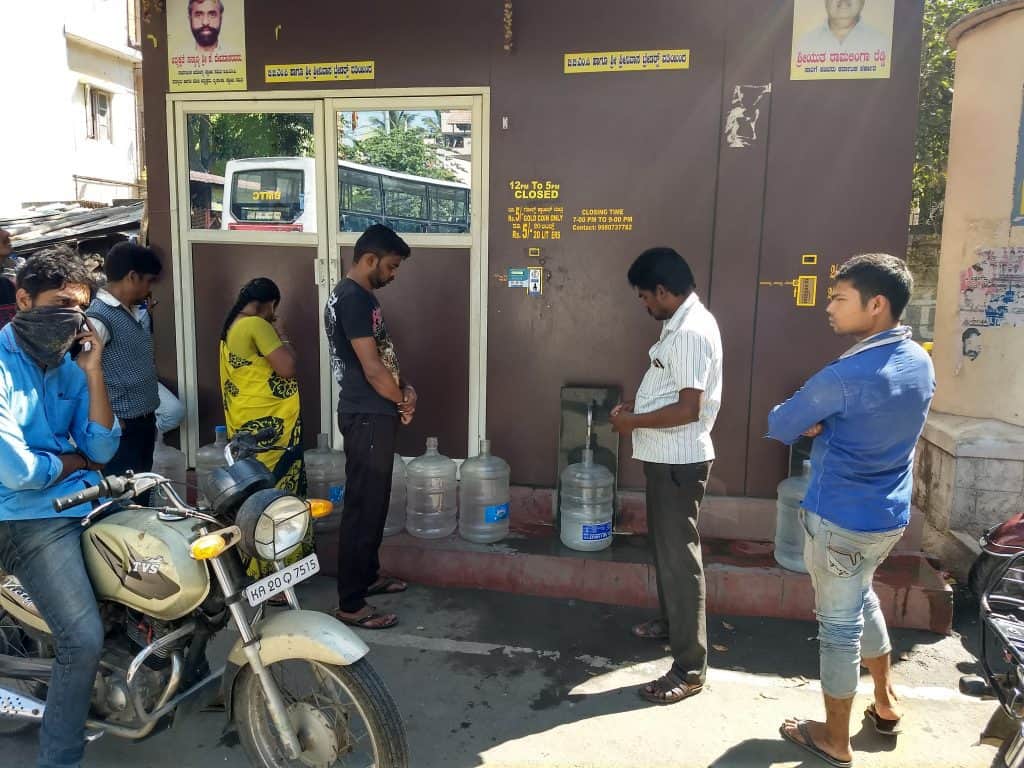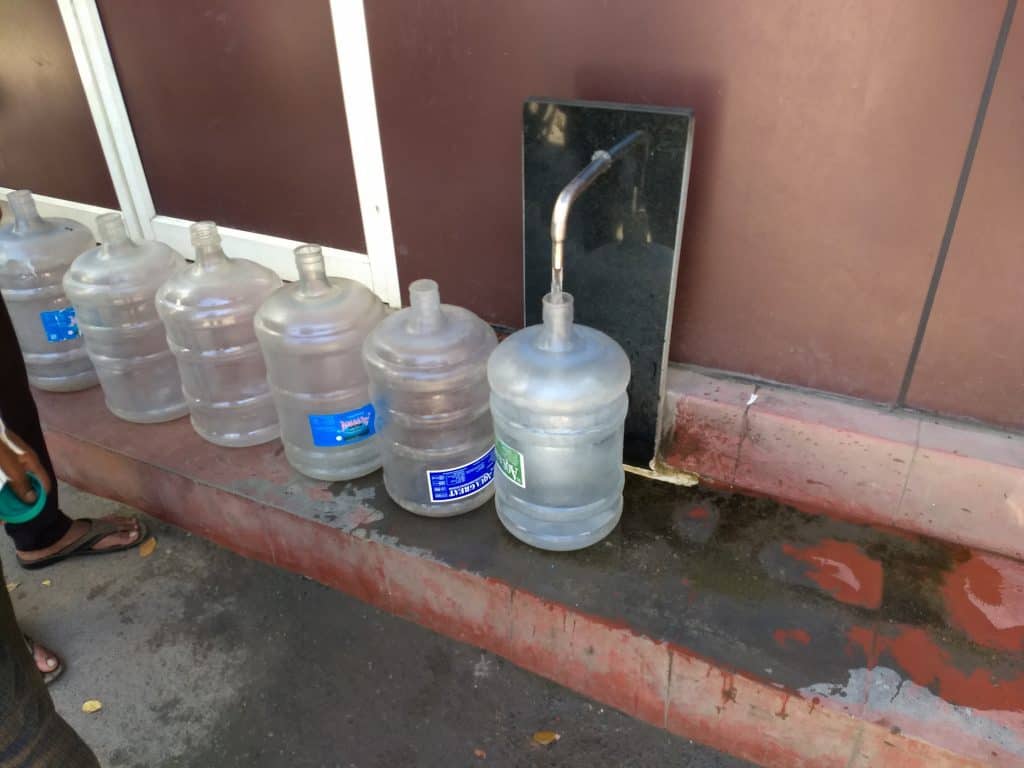It is 4 pm. A man comes in a bike, parks it near the HOPCOMS shop near Mariyappanapalya Park in Rajajinagar, Bengaluru. He walks towards the water vending machine nearby with a 20 litre water can in hand, pays, fills it and leaves the spot. Just as he is leaving, we ask him what he does with the water. He says he uses it in his panipuri business. He is a street vendor whose business depends on this safe water dispensed by the vending machine, popularly known as water ATM.
This water ATM was started in 2015 as a BBMP initiative. The machine sells about 2000 litres of water per day, and dispenses 20 litres at a time when a golden five-rupee coin is used. The corporator and the Member of Legislative Assembly are in charge of the water ATMs in Rajajinagar.

People queue up in front of a water ATM in Bengaluru, to fetch drinking water. Pic: Sharathkumar Nair
Water ATMs are common in Bengaluru – almost every area has a water ATM. Dr. Water ATM located at Jayanagar dispenses around 6000 litres daily. Maruthi KH, a resident of Jayanagar, 7th Phase says he doesn’t use Kaveri water for drinking as it contains a lot of impurities. “We have to spend Rs 2000 every six months to change the filter in the RO system. Instead of spending money on changing the filter, we decided to buy water from ATM. My family of four needs only 40 litres of drinking water a week.”
Useful for everyone
“I have been using water from the BBMP water ATM for over a year for cooking and drinking purposes. I have never received any complaints from any of my regular customers regarding the taste of the water or food,” said Dayanand, owner of Sai Dosa Centre at Bannerghatta Main Road. Regular bottled water costs Rs 80 for 20 litre, while water from vending machines costs Rs 5.
BBMP water ATMs started functioning in Basavanagudi during April 2017. These machines accept one, two and five rupee coins. Water sold here per day varies based on seasons: 3000 litres during summer, 1200-1500 Liters in winter. This water ATM opens at 6 am and closes at 10.30 pm. There are six other outlets in this constituency. The caretakers clean water filters every alternate day. Electricity bill here is Rs 7000 per month.
Water ATMs in the K R Puram constituency are comparatively smaller. Water from these ATMs is mostly used by the slum dwellers. “Instead of drinking dirty water, we are all able to afford some good quality water with a very small amount of money,” says Nagaraj, a slum-dweller in KR Puram. This water ATM is sponsored by a local trust. It draws water from a borewell.
Some of these machines accept only golden five-rupee coins while others accept one and two rupee coins. The five rupee coin provides 20 liters of water whereas the two rupee coins provide 8 litres, and a one-rupee coin provides 4 litres of water.
Each of these water ATMs has about two to three caretakers to ensure smooth operations. The expenses are managed by the total amount received through the daily sales at the ATMs.
However, there are no regulations on the quantity of water a person can draw from vending machines. There is no system to stop misuse of water for commercial purposes.

A water ATM in J P Nagar. Pic: Sharathkumar Nair
Government vs private water vending machines
Both private and government ATMs are competing with each other to capture the market of drinking water in the city. Water Health, a US-based Social Enterprise has installed water ATMs across the city. Dr. Water ATM provides clean drinking water to its customers at a nominal rate of Rs 8 for every 20 litres.
According to Gauri, a business associate from Water Health, the filtration units are cleaned daily to ensure quality. Water is checked for quality often and the report is displayed at every Dr. Water ATM unit. Technicians visit all units every month for maintenance. “When there is a breakdown, or when the unit needs spare parts, Water Health arranges it immediately.
Unlike private water ATMs, government-owned water ATMs are unable to dispense water during a power outage as they do not have a power backup installed.
Water is generally drawn from local borewells and is purified through Reverse Osmosis and Ultraviolet Irradiation. The process is as follows: Reverse Osmosis (RO) plants have a sand filter that removes physical impurities like sand, dust, rust, and mud. The water then flows into carbon filter which removes color, carbon granules and unpleasant odors.
Any impurities within 5 microns in size are removed by the Cartridge filter, and impurities within 0.001 microns are removed by the RO membrane. In the second stage, the ultraviolet rays remove biological impurities like bacteria and fungi.
Why is water ATM important?
According to a NITI Aayog Report, 600 million Indians face high to extreme water stress. India is placed at 120th position out of 122 countries in water quality index. Every year, 2 lakh people die due to lack of access to safe water. By 2030, the country’s water demand is projected to be twice the water supply. Annually, around 37.7 million Indians are affected by water-borne diseases and 1.5 million children are estimated to die of diarrhea, says a report published by India Environment Portal, a website for environment and development issues hosted by the Centre of Science and Environment.
The right to access to clean drinking water is a fundamental right under Indian constitution, guaranteed by Article 21. The State is duty-bound not only to provide adequate drinking water but also to protect water sources from pollution and encroachment. Any act of the State that allows pollution of water bodies “must be treated as arbitrary and contrary to public interest and in violation of the right to clean water under Article 21”, according to a 2015 Supreme Court judgment.
Water ATMs provide relief to people who reside in areas where access to clean drinking water is a challenge. Instead of providing water free of cost, the government is charging nominally for water, and allowing the private sector to operate in the field too.
Note: Vinod Kumar, Sharathkumar Nair and Rahna Jacob contributed to this article.
There are a few of machines in dwarka nagar, yelahanka too!
Above information was helpful for me.
Thanks for sharing this awesome initiative take by govt.
There is a shortage of water supply by BWSSB in Yelahanka (Kogilu/Maruthinagar) which works in favor of private Water ATMs to charge double per litre. If BWSSB works correctly and provides water to each roads, monopoly by these private holders can be broken and will help all.